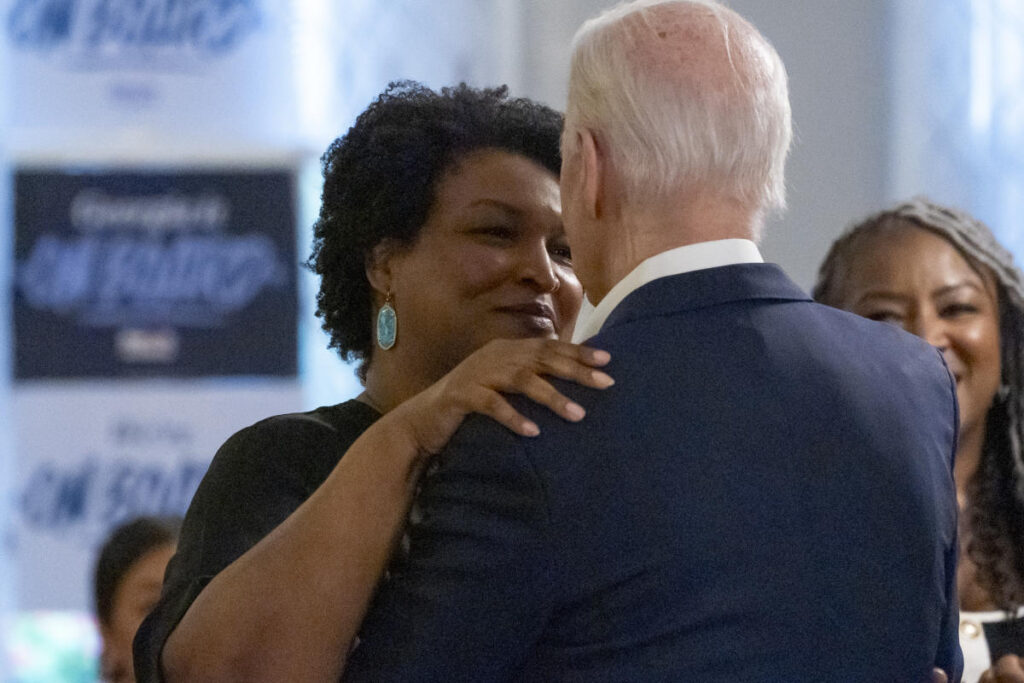Stacey Abrams once believed herself to be a strong contender for the vice presidency alongside Joe Biden in 2020, only to see that position awarded to Kamala Harris. As both women navigated through their political careers, their paths remained somewhat parallel yet largely disconnected. In the current electoral landscape, Harris is trying to replicate Biden’s surprising success in Georgia, a victory credited mainly to Abrams’ organizational and fundraising abilities. However, there is growing concern regarding Abrams’ influence as her previous political prominence seems to have waned. Many speculate that while Abrams once rallied voters to great effect, her current capacity to mobilize the electorate may not match the impact she had in earlier campaigns. Her notable absence from the campaign trail in the initial stages after Harris secured the nomination also raises questions about her political clout.
The organizations and nonprofits that Abrams founded, initially celebrated for their success in increasing voter registration among marginalized communities, appear to be struggling. Fair Fight Action, designed to promote voting rights, is currently burdened by a considerable debt, a stark contrast to its financial health in the previous election cycle. Similarly, the New Georgia Project is attempting to rebuild after setbacks, including leadership changes and funding scandal. The relationship between Abrams and these nonprofits remains significant; although she is no longer directly involved, they relied heavily on her political brand, which has diminished following her substantial loss to Republican Governor Brian Kemp in their rematch in 2022. This defeat, coupled with her dwindling influence and funds in the current election cycle, has led many to question whether her legacy remains potent enough to galvanize voters as it once did.
Despite these setbacks, Democratic officials in Georgia express hopes that the organizational structures laid down by Abrams can still positively influence the party’s prospects in the upcoming elections. Though Abrams is no longer at the forefront of Georgia’s Democratic initiatives, she has developed a network of organizations and trained many grassroots activists, which might help mobilize support for Harris in this tight electoral race. Her earlier successes in engaging young voters and marginalized communities remain a point of hope for some party leaders who believe that her legacy can provide significant groundwork for Harris’s campaign.
In the thick of their political journeys, Harris and Abrams epitomize different facets of Black womanhood and political identity in America, offering unique perspectives on the race and gender dynamics of electoral politics. While both women are frequently grouped together as trailblazers within the Democratic Party, their backgrounds notably set them apart. Harris’s upbringing as an immigrant’s daughter in California contrasts sharply with Abrams’ more conservative Southern roots in Mississippi. Both women have also faced distinct challenges, such as Harris navigating criticism rooted in racial stereotypes and gender bias, often minimized by her attempts to maintain a focused political demeanor. In tandem, Abrams has tackled issues of race and gender while addressing combating critiques directed toward Harris as an unfair reflection of the systemic biases in American society.
Abrams’ electoral narrative began to take a hit following her defeat to Kemp in 2022, a loss attributed in part to her focus on supporting other Democrats rather than concentrating solely on her gubernatorial campaign. As she shifted her focus to the bigger picture, strategizing for the party’s success at large, it appears this ultimately affected her personal political aspirations. Some in political circles believe that while her work may have strengthened the Democratic political machinery in Georgia, it came at a cost to her brand, diluting her potential impact for upcoming elections. The notion that establishing broader Democratic victories might undermine her credibility in her own political endeavors has become a focal point in understanding her diminished role in recent campaigns.
The challenges faced by Abrams haven’t just been personal; they also reflect an evolving political landscape in Georgia. The organizations born from her advocacy efforts have come under scrutiny, struggling with financial mismanagement and controversies that have left them less effective. Smaller grassroots organizations now seek to fill the gap created by the inconsistencies of Abrams’ network, although they, too, face hurdles in acquiring necessary funding to be effective. The ultimate question remains whether these alternative organizations can surge in a rapidly changing environment with political leanings appearing to pivot toward Republican candidates in statewide elections. Despite the close polling numbers, the long-term viability of Abrams’ earlier strategies and structures remains in doubt as electoral dynamics shift with the growing support for Donald Trump in the region.
As the countdown towards the election date continues, many hope that Abrams’s late-in-the-game revitalization can make a significant difference. With her attending more rallies and coordinating canvassing events, Georgia Democrats are rallying behind her nearly in desperation, hoping her presence can sway voters in favor of Harris. Public engagements are crucial, not only in demonstrating solidarity but in reaffirming her relationship with the people she once mobilized effectively. The anticipation builds as Abrams maintains public confidence in Harris’s chances in Georgia, asserting that the groundwork laid during her campaigns can still inspire impactful turnout. Her belief in a Democratic resurgence in Georgia resonates with many, positioning her as a pivotal figure—even as she navigates the dual realities of diminished visibility in recent years and a still-prominent role in Georgia’s political landscape.

